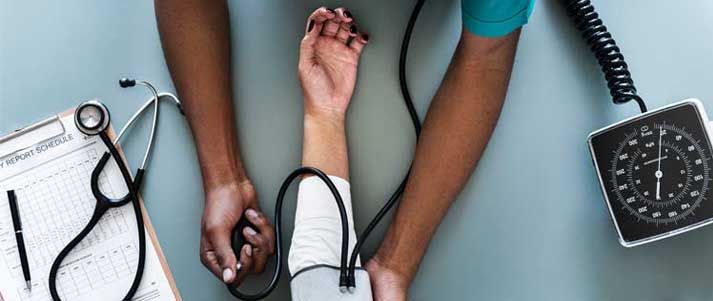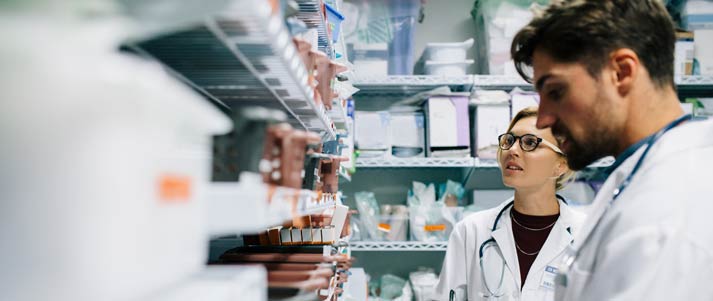Paid clinical trials for medical research
Taking part in paid clinical drug trials can bump up your bank balance, but it's super important to know the facts before you sign up for medical trials.

Credit: Julia Zavalishina, New Africa – Shutterstock
It's not uncommon for cash-strapped students to volunteer their bodies for clinical trials in exchange for money.
With research payments typically around £100 per day (with the potential to earn thousands), it's not surprising that around 4% of students in our latest National Student Money Survey said they made money from drug trials.
There are mixed reviews and concerns about participating in paid drug trials to make money. This guide explains all you need to know before deciding whether or not to go ahead with volunteering.
We'll cover what a paid clinical trial involves and some of the most trusted and best-paying medical research companies to work for.
What's in this guide?
Should you sign up for a paid clinical trial?
Thanks to medical research, there's always a constant supply of new drugs appearing on the market.
As well as being great for those in need of new medications, this also means there's always a high demand for people to test these drugs for cash.
Pharmaceutical companies need to ensure their product is safe before they can start selling them. That's why paying willing humans to test them is an important way to get new drugs and treatments onto the market.
While this can sound a bit scary, it's worth knowing that these drugs will have been through various other tests before making it to the human-trial stage, so they're relatively risk-free.
But while there are jobs aplenty, the cash incentives are high, and the effort involved is pretty minimal, you should always weigh up the facts first.
Do you meet the criteria for a clinical trial?
Most paid medical trials will have specific requirements you need to meet in order to take part.
While age isn't usually a factor (generally anyone between the ages of 18–75 is fine), you will likely need to be in pretty good health, a non-smoker and not drink too much either. We realise the latter may rule a lot of us out already...
On the flip side, other trials might ask for people with specific requirements and ailments, such as asthma sufferers, women on the contraceptive pill, or diabetics – it all depends on the type of trial you're taking part in.
Just make sure you know what you're signing up for – and whatever you do, don't lie!
12 important facts about paid clinical trials
Here are the main factors to consider before signing up for any medical testing for money:
-
Clinical trials have multiple phases
Drug studies move through different phases, and which phase a trial is in depends on how much research has been done on the drug already.
A phase one trial, also known as a 'first man in', means you'll be the first person to ever take the drug. However, for better or for worse, it will have been thoroughly tested on animals first, so the researchers will be confident enough that it's safe for a human.
Phase two trials are the next stage, where you'll be among the second round of people to take the drug. Phase three is (you guessed it) the third round of testing, and so on.
Obviously, the further from the first round you are, the less risky it's likely to be.
-
You'll be given an examination before taking part

Once you sign up for a drug trial, you'll be given a full medical examination to make sure you're suitable to take part. If the company decides to use you as a volunteer, you'll be given the green light to be a tester.
You should be prepared for a 'no' though – not everyone passes this stage.
-
You can do paid sleep studies
Don't worry, we're not click-baiting you – you really can take part in studies where you get paid to sleep.
As you'd expect, sleep studies are used to help researchers gain a deeper understanding of what can help and hinder our ability to sleep. They're also used to develop strategies for treating sleep disorders.
Unlike in a standard clinical trial, there's a decent chance that a paid sleep study won't require you to take a drug or contract a mild form of a disease.
Instead, you'll likely have to spend a night (or several nights, or even a day!) getting some shut-eye in a secure lab. Under these conditions, they'll be able to control noise, light, temperature and a whole range of other factors to examine how your ability to sleep is affected.
Just note that you could be hooked up to a few machines to monitor things like your heart rate and brain activity.
-
Riskier clinical trials don't always pay more
Although it may seem as though you should, you won't necessarily get paid more to test drugs that carry more risk.
Instead, payment is generally worked out by the length of time spent on the trial. How many days you need to show up, how much time you spend taking part, and the length of the trial will affect the pay as opposed to the kind of test or drugs involved.
You might also be offered an allowance to cover your travel to and from test centres. It's the least they can do, really!
-
Clinical trials can last several weeks
Depending on the trial, you may only be asked to stay overnight – but it's not unusual for tests to demand a two-week (or more) stay on-site.
As such, it's worth considering that this could disrupt your studies and social life. Is it worth the cash?
Think of it this way – you're paying for your lectures (here's how much your uni costs per lecture), so skipping these to make cash would be a false economy.
Plus, how are you going to get that first-class degree if you're skipping class to take drugs (medical drugs, admittedly)?
-
You might take a placebo drug in medical trials

Not everyone involved in a clinical trial will actually end up taking the drug that's being tested.
While some people will be given the drug, some might be given something similar but with a slight difference. Others will get a placebo (a fake drug) to establish whether or not the effects of the drug are all in the minds of the participants.
But don't worry – whatever you end up taking, you'll still be getting paid the same.
-
Drug trials might involve needles
If you're not a fan of needles, then this could be a problem for you. Chances are, you'll have to undergo some tests before taking part – including giving a blood sample.
If you can handle this bit, it shouldn't get much worse than that. In fact, lots of volunteers report getting paid to sit around and play the PlayStation, or having the chance to catch up on writing essays.
-
There will always be risks involved in a clinical trial
Lounging about and getting paid for the pleasure does sound mighty appealing, but don't forget there will always be an element of risk involved in drug trials.
Some drugs will have common side effects such as nausea, fainting and headaches, which could wipe you out for a few days – but others could be more serious.
In 2017, two students who took part in an experiment at Northumbria University were accidentally given a dose of caffeine equivalent to 300 cups of coffee in one go. They were left fighting for their lives in hospital and the university was fined £400,000 for the error.
While this is obviously terrifying, it's worth remembering these things happen extremely rarely.
-
Clinical trials are regulated

Credit: Jacob Lund – Shutterstock
It's also worth noting that trials aren't just devised willy-nilly. All clinical tests must correspond to the regulations set up by the MHRA (the Medicines and Healthcare products Regulatory Agency) and be approved by an ethics committee.
In other words, a lot of people have decided it's safe enough for humans to take part before the researchers have even recruited participants.
And, while clinical trials can be risky, those who are prepared to take the risk are invaluable to developing new drugs.
The NHS and other medical institutions urge volunteers not to be put off by medical trials, as they are essential to the development of new treatments – so you might as well put on a cape and call yourself a superhero for the day.
-
You should register for aftercare
Some drugs will have expected side effects that you don't really have to worry too much about (such as nausea and headaches). But there are some side effects that can't be predicted, so it's important to go for medical checkups afterwards.
Make sure you're contracted to receive the adequate amount of care for this and let your own doctor know that you're taking part in the trial so they can monitor you for any adverse side effects.
-
You're free to leave at any time
Clinical trial volunteers are able to withdraw from studies at any time, so if you feel like it's all getting a bit too much or you don't like the way things are going, you always have the option to bow out.
However, if you're not 100% sure you're up to the challenge, we'd probably advise against signing up in the first place. These trials cost a lot of money to conduct, so it's best not to take the spot of someone who's more confident that they'll see it through.
-
There are lots of companies to choose from
You should always research a range of companies before signing up for any medical trials, as this should increase your chances of finding someone credible.
Don't be swayed by the biggest payout. A company researching for a 'better' product than its competitors may be biased with its results, and this could impact your care.
Check out our list below of trusted clinical trial companies for an idea of where to start your search.
What's involved in a paid clinical trial?

Credit: WAYHOME studio – Shutterstock
There's no denying that there's a lot of fear-mongering and myths around medical experiments for money. So, to help separate the fact from the fiction, we spoke to Sarah. At the time, Sarah was an Engineering student at Imperial College London and took part in an HIV vaccine trial during her time at uni.
Sarah had been looking at drug trials with some of the more popular companies, but eventually settled on a study she found through an ad on Facebook. By chance, it was being run by the research wing of her very own uni, so she applied.
But, before being accepted, the researchers had to check if Sarah fit the profile they were looking for.
I had to be tested to ensure I was HIV negative, and I couldn't be part of an 'at-risk' group. I also had to be on hormonal contraception, have no long-term illnesses and couldn't have antibodies to spread strains of the flu virus which were used in the trial.
Anyone living with an adult or child who was vulnerable (health-wise) was ineligible to take part too.
Sarah ticked all the boxes, but even then the researchers were keen to stress that no drug trial is 100% safe.
Are clinical trials safe?
The very nature of these studies is such that the drugs have only been tested on humans a handful of times, if at all. While the preceding research, often including animal studies, gives them a very good indication of how humans will react, there are no guarantees.
They actually explained how they hoped the vaccine would work, which was really interesting.
They gave me a list of potential side effects but explained that not all of the drugs had been tested enough to know what side effects they could cause. The trial I took part in would help determine this for the future.
Sarah wasn't put off by this, and thus she became one of the subjects for the study. As it happens, Sarah didn't experience any side effects at all – but again, as we touched on earlier, it's important to note that this won't always be the case.
Taking part in a paid clinical trial
Unlike some drug trials, like FluCamp, Sarah wasn't required to live in lab conditions for a prolonged period of time. Instead, she was able to go about her life as normal.
The trial took place over seven months, but I didn't have to live in a purpose-built lab – it was made up of 11 short visits (at most three hours) over the seven-month period.
The sessions involved taking blood, taking nasal swabs and so on, as well as having all my vital signs checked. I also had to do a pregnancy test.
While you may hear stories of drug trial companies paying you to sit in a room for two weeks playing FIFA and streaming films and TV, that's certainly not the only way a trial can go down. Of course, if you're not one for lazing around for days on end, this may come as a bit of welcome news.
How much money can you make from clinical trials?
If we're talking about it in purely financial terms, clinical trials are certainly appealing.
At the end of Sarah's clinical trial, she was paid a lump sum of £1,350 plus travel expenses. Even if each of the 11 visits took three hours (and remember, Sarah said that this was the absolute maximum time that one would last for), it would still work out at over £40/hour – that's the equivalent of over £50,000/year!
Interestingly, though, Sarah didn't take part for the money – she was just fascinated by the science behind it all.
I was genuinely interested and thought it would be pretty cool if the drug (an HIV vaccine) ended up being used. Also, selling your body to science isn't a bad story to tell at parties!
Although the money was a nice bonus, the trial wasn't something I did because I needed money.
For obvious reasons, they don't like you to do too many trials, and of course there is always the risk of getting ill.
I'd absolutely recommend it – but as a nice bit of spare cash, as opposed to making money for living.
Trusted paid clinical trial companies
These are the best and most reliable places to find drug trials:
-
Educational institutes
If you live near a teaching hospital then this is the perfect place to make an initial enquiry. Alternatively, like Sarah, you could even look into actually taking part in a trial at your university.
You might also come across postgrads and researchers looking for people to help with carrying out low-risk research in exchange for various rewards.
-
Fortrea
One of the big names in medical research, Fortrea (formerly Labcorp), will hold around 30 trials a year.
You can expect to be paid £200 per day or more, depending on the type of trial. And, on top of that, you can earn extra money for referring friends who are successfully admitted onto a trial.
-
Trials4us
Trials4us is the largest clinical trial organisation in the UK, testing drugs for various conditions and illnesses.
You can earn £100 per day and many of their trials pay over £1,000. The higher paying trials will usually have an in-house period and a few follow-up appointments though. You can also recommend a friend and get up to £250 as a reward.
Trials4us sometimes offers money for blood donation (provided you fit the right blood category) and some trials involve paid psychological studies as opposed to drug-taking.
-
FluCamp
FluCamp has over 25 years of experience in running clinical studies and their main aim is to find treatments for viruses like the common cold and flu.
FluCamp pays well. If you're selected you can expect up to £4,400 per trial (£5,280 for Asthma trials). Trials tend to last 11–14 days. Just be aware that you will be quarantined during this time.
Our cash injection inspiration doesn't end there. Check out our guide to making money quickly for dozens more ideas.












